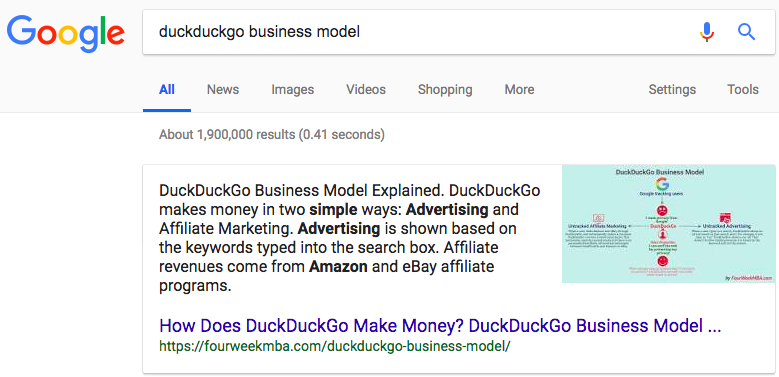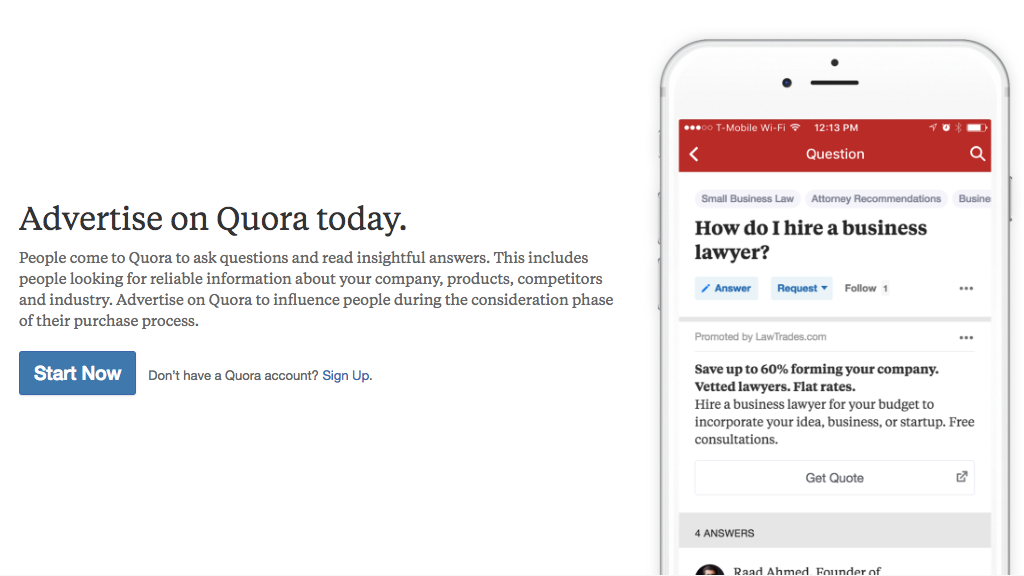Latest news about Bitcoin and all cryptocurrencies. Your daily crypto news habit.

The answers merchants
If I were to compare Quora advertising network, I’d instead compare it to Google than Facebook. Quora, just like Google tries to organize information. They do it in different ways. Google allows you to search for anything and find a perfect match with existing paid content (ads) and organic content (any site it can crawl, index and rank) through a massive algorithm comprised of many parts, which also leverages on human quality raters.
Quora instead tries to match information, in the form of questions with humans that are willing to answer to those questions. While it is a Q&A system, Quora also leverages on a search to retrieve the massive amount of questions stored in its database.
The similarity here is that both Google and Quora tries to answer as many questions as possible. Indeed, Google is more and more skewed toward giving direct answers to users in the form of featured snippets:
Example of a Google featured snippet that offers a direct answer on a search “DuckDuckGo business model.”
In other words, Google “decides” when it makes sense to provide direct answers based on specific keywords. The advantage of Google right now is that it has become a powerful semantic engine able to provide a vast array of answers. As shown by MozCast (based on a set of 10k searches) those direct answers are showing up at least half of the time people search for something:
Source: MozCast On a collection of 10k searches, Mox shows how featured snippets and knowledge panels (two features of Google which aim is to provide direct answers) provide an answer half of the time
On its hand, Quora also tries to provide as many answers on any topic. In short, the web is moving from a place where you could find the content of any kind, to a place where you can find in most cases answers to any question you might have.
While Google and Quora look for answers to users, they do it in a completely different way. Google doesn’t have an issue in terms of questions the user can ask. It is all the way around. As Google is the largest repository of people searches, it is now fine-tuning its search algorithm to make it able to provide an answer to any question or keyword that where an answer would fit well.
Quora instead, while it has humans answering to any questions and it uses its algorithms to match a question to a person that might be able to provide an answer it has to make sure that people keep asking interesting questions, but interesting for whom?
Quora attempts to fine-tune its business model
As Quora business model is skewed toward user-generated content, it is vital for Quora to keep producing content which is relevant. However, there is another critical piece of the puzzle: advertising.
In terms of monetization Quora’s business model is based on two main foundations:
- Investors, looking for ROI through exit or IPO
- And publishers/online businesses looking for ROI through advertising
Since Quora has launched its advertising program, there is no doubt the company is doubling down on that:
The mechanism is simple. You set up your account, your copy, chose your audience and you only pay if people click on that advertising!
The logic is not far from Google AdWords. Yet as I highlighted several times on this blog a business model is way more complicated than a monetization strategy. Therefore, for Quora business model to success, it needs to bring several moving parts together to make its business model finally sustainable.
Google become successful when it managed to create a balance between paid results and organic answers. This was achieved via two main networks, AdWords and AdSense. Quora is now trying to find the same balance but from a different angle.
You might think that the central issue of Quora is to keep having people answer questions on the platform. In this context though what matters the most to Quora is to make sure people keep asking questions that can generate ads revenues. Indeed, what keeps the platform alive and viable from the commercial standpoint is its ability to address questions that people find interesting. Thus, it is not a matter of answering any quest but rather to ask the right question instead!
But how do you make sure people ask the right questions?
The questions merchant: Quora partners program and why it might be critical to its business model success
Questions are compensated based on a proportion of the advertising revenue they generate. This is a result of how well-answered they are and how many people find them interesting. After you ask a question, you will earn money on it for 1 year.
This is what Quora specifies on its partner program page. In other words, Quora wants to leverage monetization and economic incentives to have people write compelling questions. Thus, the company is making a good point: the value (both commercial and not) is in the questions users pose.
As specified by Quora “The program is invite-only at this time, but we intend to open it up to more people as time goes on.“
As specified in its announcement:
Good question pages are fundamental to making Quora a great place for writers and for anyone who wants to better understand the world. Today, we’re excited to share a new program that will help ensure that Quora always offers the most interesting and useful questions. The Quora Partner Program will compensate participants for adding good questions that many people in the world may have.
This might sound quite counterintuitive, and it might disappoint people that spend much effort in producing content on Quora, but the reality is, asking right questions is the first propeller of Quora business model. If people kept asking silly questions, no matter how philosophical, and in-depth it is the answer none will bother reading (just like a book with a bad cover or wrong title doesn’t sell).
Will this program turn out to be a critical piece in the puzzle of Quora business model?
Originally published at fourweekmba.com on October 17, 2018.
What’s The Business Of Quora? It’s About Asking The Right Question was originally published in Hacker Noon on Medium, where people are continuing the conversation by highlighting and responding to this story.
Disclaimer
The views and opinions expressed in this article are solely those of the authors and do not reflect the views of Bitcoin Insider. Every investment and trading move involves risk - this is especially true for cryptocurrencies given their volatility. We strongly advise our readers to conduct their own research when making a decision.


